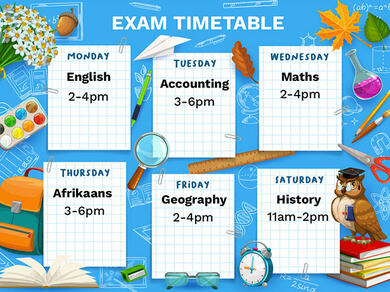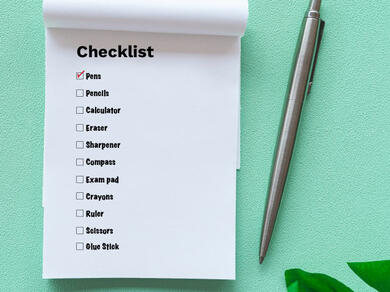Top tips to plan and prepare for exams

Exams are the unescapable evil curse that hang over us all unavoidably. It starts from our first tests at school when we are very young and progresses right throughout our school career and beyond, should we wish to study further.
Matric exams have enormous hype and pressure, which is anxiety-provoking for parents and learners.
However, it is a hurdle that we all jump and survive. The earlier in life that we prepare ourselves to be well equipped, the better we get reaching the higher grades and university.
The keywords that stand out are PLANNING AND PREPARATION.
We will assist you with some self-help tips to get through the pre-exam period and the actual writing of your exams. Good luck and make use of this handy guide.
Pay attention in class throughout the year. Ask your teacher to explain what you don’t understand at the time so that you do not panic before an exam. Work consistently throughout the year, always doing your homework and assignments. There are no shortcuts to success. You need to apply yourself. Do not leave studying until the night before an exam.


Plan a timetable well in advance, with the help of your teacher or parent, if need be. Start studying at least three weeks in advance. Devise a method that works for you, whether working with a study buddy, mind mapping, summarising, highlighting keywords, or using mnemonics. Closer to exam time, concentrate on revising those notes and methods that work for you.
Study in an environment that is free of distractions. Having a TV on or people chatting around you will distract you and not allow you to absorb the necessary information. Some people require total quietness; others study best with soft background music. Work out, depending on your age, grade, concentration span and how long you can work without a break. It may be an hour; for others, it is more prolonged.


If you find your mind wandering and have been studying for a while, take a break but do not allow it to exceed 15 minutes. Within that time, your brain absorbs and processes the information you have studied. Your break time must be spent constructively. Either lie down and close your eyes. Set the alarm in case you fall asleep. Take a walk around the block where safe to do so. Partake in Yoga or any form of exercise. Fresh air and a piece of fruit are good too.
STAY AWAY FROM ALL ELECTRONIC DEVICES – CELL PHONES AND TV overstimulate your mind and do not allow you to absorb or process the content you have studied.
For those writing Grade 12, many students find it helpful to go through past papers as sometimes the same questions come up again. DO NOT SPOT STUDY – what that means is assuming what may and may not come up in the exam paper. Be guided by your teacher and study all content thoroughly that you are advised to.


Make sure you exercise, eat healthily, and get a good night’s sleep from the pre-exam stage to the completion of exams. You may want to ask a friend or your parent to test you at the end of sections or chapters.
Check that you have all necessary stationery and equipment for the exam at least one week before the time. Do not leave anything until the last minute that will unsettle you and create stress or anxiety. If you are writing and not using digital devices for your answers, make sure that your pen has sufficient ink and that you have a spare pen and ruler.
The night before the exam, get to sleep early and avoid cramming. Do not leave anything for the last minute. Be 100% sure that you have an updated timetable and know precisely what subject you are writing on what day.


On the day of the exam, have a good healthy breakfast, stay calm and check that you have everything you require. Pack your bag the previous day. Plan to arrive early so that obstacles do not delay you.
When you arrive at the examination venue, breathe deep and stay calm. Do not allow fellow students to unsettle or confuse you. During the exam, read the question paper very carefully. Ensure you understand the question and answer only what is asked. Always remember to turn the page to be sure that you have not missed out on any sections. Check your answer paper to ensure you have answered all questions correctly. Multiple choice questions may cause confusion. Most often, your first answer is correct. Do not forget to put your name or code on the answer paper. Keep your eye on the clock and work at a steady pace. Always answer the questions you know first unless you are required to answer chronologically, as some question papers do.
Once you have handed it in, avoid analysing and comparing answers with friends. It’s done and over and can’t be changed; creating anxiety will only be negative.


When you get home, REST. Eat, sleep, and go for a run before beginning to study for the next exam. Don’t look back; you aren’t going that way! Focus on what lies ahead. Apply yourself to the best of your ability.
